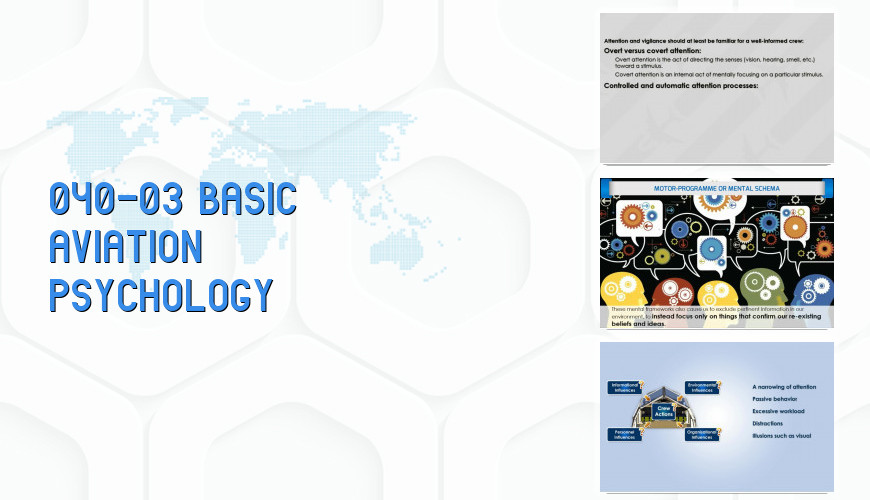
Course Information
Attention is the ability to focus and maintain interest in a given task or idea while avoiding distractions. The definitions of attention are varied depending on the field from which the definition is taken. All share the central theme of attention involving the concentration of thinking on a single object or thought to the exclusion of other thoughts. Selective attention is process in which inputs are sampled and given a priority. Detailed processing can only process one complex task. If there are too many elements on the attention then information will be lost for example more than three items communicated on an ATC clearance. Divided attention refers to situations when an individual must conduct multiple tasks at the same time, causing the tasks to compete for limited attention resources. This situation is often referred to as multitasking. Courses are constantly monitored and updated when major changes in authority documentation is released.
Content of the Course
| Slide | 107 | Duration | 1:13:35 | Exam | No |
|---|
- COURSE START
- HUMAN INFORMATION PROCESSING / ATTENTION AND VIGILANCE
- Perception
- Memory
- Response Selection
- HUMAN ERROR AND RELIABILITY / RELIABILITY OF HUMAN BEHAVIOUR
- Mental Models And Situation Awareness
- Theory And Model Of Human Error
- Error Generation
- DECISION MAKING / DECISION-MAKING CONCEPTS
- AVOIDING AND MANAGING ERRORS: COCKPIT MANAGEMENT / SAFETY AWARENESS
- Co-Ordination (Multi-Crew Concepts)
- Co-Operation
- Communication
- HUMAN BEHAVIOUR / PERSONALITY, ATTITUDE AND BEHAVIOUR
- Individual Differences In Personality And Motivation
- Identification Of Hazardous Attitudes (Error Proneness)
- HUMAN OVERLOAD AND UNDERLOAD / AROUSAL
- Stress
- Fatigue And Stress Management
- ADVANCED COCKPIT AUTOMATION / ADVANTAGES AND DISADVANTAGES
- Automation Complacency
- Working Concepts
- COURSE END

